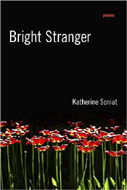 Katherine Soniat
Katherine Soniat
Bright Stranger
Louisiana State University Press
ISBN: 978-0-8071-6241-5
Reviewer: Lynn Levin
Bright Stranger, Katherine Soniat’s new collection of dreamy, explorative, elegant poems, takes us on many trails—on a hike through the Grand Canyon, along Orpheus’s descent into Hades, through geological time, mythic time, and fragments of the speaker’s life. Many of the poems take as their subject death or a quasi-morbid state; they then rise from those depths to reveal a freer and more knowing perspective, the speaker’s acquired wisdom. That, perhaps, sounds ambiguous and airy; however, openness and indefiniteness are important aspects of Soniat’s voice and spiritual attitude. In “Easter Inventory,” she writes, “Stillness in the moonlit mirrors— / one marked out, the other // deeper into wander.” The poet knows that a poem is entitled to keep some of its secrets.
Along with the ambiguity in many of the poems comes a contrasting toughness and physical fortitude. The speaker often describes hiking in rough country, desolate places, and high altitudes. She meets other hikers, encounters Native American ruins, and hears coyotes in the desert. She floats in a stream. This immersion in the natural world offers the speaker a chance to confront and engage the deep grief at the center of many of the poems. Some poems explore a son’s death (there are hints that it was a suicide), the loss of a lover, the death of a former husband. The speaker is in constant motion, finding a way to explore solitude and bereavement, and stoically live with them.
The book’s title feels ironic given the darkness of the poems, but the poems sometimes spring toward moments of light and imagery that catch fire. In the title poem, a darting fox becomes “a glimpse of fur // and flame in the branches.” The fox has “lit red fur.” At another point, the speaker sees the lost son as a Eurydice figure caught in the underworld, yet framed in light so that a “door shone bright around him.” In other poems the moon, as an image of brightness, appears with its distant glimmer.
Soniat has organized the collection into seven sections, each of which takes its title from selected lines drawn from a poem in that section. And those section-title lines have a mystical tone, part of the poet’s signature voice. The first section is entitled “study night and the river as if they hold the twin// of all that disappeared.” The second section is called “create volume and depth like you’re sending them / to a friend who’s never felt such before.” Many of the lines include gaps that highlight the absence of those whom the speaker has lost. The white space reflects the speaker’s struggle to convey the unsayable and the unfathomable.
In “Things That Hang in the Air,” Soniat meditates, suspended in a disturbing and dreamy darkness, yet alive in the mysteries of being:
Expanse of sky, our boat under the stars—anything possible with pen
and paper. Now I’m busy erasing a triangulation of boat and stars. One
of the former, two the latter. Rocking on water makes me want to smear
the fiery dots, and be no party to loss. Dead reckonings. Me, entitled
to nothing beneath the stars. And even if it was years ago on a lake—
cyclical sway of the tides, fish nudging our ankles—we swam under
loose arrangements. Scorpius. Ursa Major.
Beasts of perception, not of starlight. Imposed too, that musical
notation to hold silence longer or extend the score. Double edge
of the fermata like wordless Eurydice whose thoughts carried on
past the story. How long she shut up, shut down in hell, Hades
her composer. Calls for lost children sometimes drift across
the water….
These days, more and more poems trend to the subjective and associative. They deploy parataxis, conjoining clauses without explicit coordinating or subordinating terms, leaving the reader to supply the connecting ideas. They function in gaps. They invoke silence through the use of white space. As abstract art often navigates the limits of subjectivity and inaccessibility, many contemporary poems break away from conventional speech, favoring a disrupted or fragmented syntax that echoes emotional turbulence or chaos. At times, Soniat utilizes these techniques, though she does not apply them radically. She has many lines of direct statement; she has many that float freely, grazing emotions and perceptions in asymptotic fashion. I conclude this review by quoting from the first poem in the book, “Shade”:
…Study night and the river
as if they hold the twin of all that disappeared.
I’ve felt through shadows in the dirt, and wanted
to be like that. Dark and humid.
A lowness,
not these passing thoughts, my questions
answered by minutiae. Equivocation—headlights
blur along the ridge, travelers caught in fog.
Years ago I held a match to glyphs in a limestone cave, then
walked the old path down to the river. At noon it stopped
by water.
That’s when I floated facedown on the current—
my body offering anonymity to each small thing below.
The poems in Katherine Soniat’s Bright Stranger reach through grief. Her style, sometimes associative and challenging, sometimes clear and direct, is an equal match for the elusive subjects she engages in these tough, graceful, and mysterious poems.

